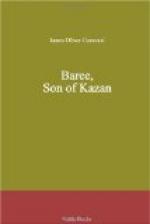That afternoon Baree took a long nap close to his cache. Then he uncovered the partridge and ate his supper. When his fourth night alone came, he did not hide himself as he had done on the three preceding nights. He was strangely and curiously alert. Under the moon and the stars he prowled in the edge of the forest and out on the burn. He listened with a new kind of thrill to the faraway cry of a wolf pack on the hunt. He listened to the ghostly whoo-whoo-whoo of the owls without shivering. Sounds and silences were beginning to hold a new and significant note for him.
For another day and night Baree remained in the vicinity of his cache. When the last bone was picked, he moved on. He now entered a country where subsistence was no longer a perilous problem for him. It was a lynx country, and where there are lynx, there are also a great many rabbits. When the rabbits thin out, the lynx emigrate to better hunting grounds. As the snowshoe rabbit breeds all the summer through, Baree found himself in a land of plenty. It was not difficult for him to catch and kill the young rabbits. For a week he prospered and grew bigger and stronger each day. But all the time, stirred by that seeking, wanderlust spirit—still hoping to find the old home and his mother—he traveled into the north and east.
And this was straight into the trapping country of Pierrot, the half-breed.
Pierrot, until two years ago, had believed himself to be one of the most fortunate men in the big wilderness. That was before La Mort Rouge—the Red Death—came. He was half French, and he had married a Cree chief’s daughter, and in their log cabin on the Gray Loon they had lived for many years in great prosperity and happiness. Pierrot was proud of three things in this wild world of his. He was immensely proud of Wyola, his royal-blooded wife. He was proud of his daughter; and he was proud of his reputation as a hunter. Until the Red Death came, life was quite complete for him. It was then—two years ago—that the smallpox killed his princess wife. He still lived in the little cabin on the Gray Loon, but he was a different Pierrot. The heart was sick in him. It would have died, had it not been for Nepeese, his daughter. His wife had named her Nepeese, which means the Willow.
Nepeese had grown up like the willow, slender as a reed, with all her mother’s wild beauty, and with a little of the French thrown in. She was sixteen, with great, dark, wonderful eyes, and hair so beautiful that an agent from Montreal passing that way had once tried to buy it. It fell in two shining braids, each as big as a man’s wrist, almost to her knees. “Non, M’sieu,” Pierrot had said, a cold glitter in his eyes as he saw what was in the agent’s face. “It is not for barter.”
Two days after Baree had entered his trapping ground, Pierrot came in from the forests with a troubled look in his face.
“Something is killing off the young beavers,” he explained to Nepeese, speaking to her in French. “It is a lynx or a wolf. Tomorrow—” He shrugged his thin shoulders, and smiled at her.




